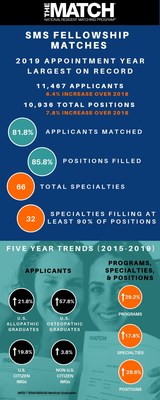NRMP Report: 2019 Appointment Year is Largest on Record for Physician Fellowship Matches
More than 9,300 fellowship positions filled through NRMP Specialties Matching Service
WASHINGTON, Feb. 21, 2019 /PRNewswire/ -- The National Resident Matching Program® (NRMP®) has released Results and Data Specialties Matching Service, 2019 Appointment Year, an annual report of physician Fellowship Matches conducted by the NRMP Specialties Matching Service® (SMS®). The report shows 11,467 active applicants with program lists competed for 10,936 fellowship positions offered by 4,750 programs, making the 2019 appointment year the largest on record and advancing a four-year growth trend. At 89.4 percent, the match rate for U.S. allopathic medical school graduates tied with the highest rate on record, set for the 2016 appointment year.

"It is gratifying to see the Specialties Matching Service continue to flourish not only by providing physicians with opportunities for more specialized training, but also by providing more robust data to our constituents in the medical education community," said NRMP President and CEO Mona M. Signer. "The SMS has been bolstered by increased numbers of participating subspecialties and programs. Participant growth also has been visible in the increases across all applicant types, particularly among graduates of osteopathic medical schools. Since 2015, the total number of active applicants has increased more than 20 percent."
The SMS report includes data on 66 subspecialties within 23 separate Matches conducted in 2018 and early 2019 and provides valuable insight into physician workforce trends. Five-year trend data by specialty, a state-by-state breakdown of participating programs, and match rates by applicant type also are included.
Program Highlights
Five new specialties joined the SMS for 2019 appointments: Adult Congenital Heart Disease and Clinical Cardiac Electrophysiology in the Medical Specialties Matching Program; Academic General Pediatrics in the Pediatric Specialties Fall Match; and Clinical Ultrasound and Emergency Medical Services in a new Emergency Medicine Match that
also includes Medical Toxicology. Headache Medicine and Obstetric Anesthesiology withdrew for 2019 appointments. Other highlights:
- Of the 10,936 positions offered through the SMS, 9,378 (85.8%) were filled.
- Of the 4,750 participating programs, 3,666 (77.2%) filled all positions.
- Of the 66 participating subspecialties, 32 filled 90 percent or more of the positions offered; 20 filled less than 75 percent.
- The most competitive specialties among those that offered at least 30 positions were Gynecologic Oncology, Maternal-Fetal Medicine, Reproductive Endocrinology, Hand Surgery, and Pediatric Surgery. All filled at least 95 percent of the positions offered, and more than 80 percent were filled by U.S. allopathic medical school graduates.
- The least competitive specialties among those that offered at least 30 positions were Clinical Ultrasound, Geriatric Medicine, Medical Genetics, Pediatric Endocrinology, Pediatric Infectious Disease, Pediatric Nephrology, Pediatric Pulmonology, and Pediatric Rheumatology. All filled less than 60 percent of the positions offered, and less than 40 percent were filled by U.S. allopathic graduates.
Applicant Highlights
- Of the 11,467 applicants who submitted program lists (active applicants), 9,378 (81.8%) obtained positions.
- The number of active U.S. allopathic medical school graduates totaled 6,301, 299 more than last year and a 5.0 percent.
- The number of active U.S. osteopathic medical school graduates totaled 1,310, 210 more than last year and a 19.1 percent.
- The number of active U.S. citizen graduates of international medical schools (IMGs) totaled 1,458, 132 more than last year and a 10.0 percent.
View full Match report and infographic
The NRMP Match
The Match uses a computerized mathematical algorithm to align the preferences of applicants with the preferences of program directors in order to fill training positions available at U.S. teaching hospitals. Research on the NRMP algorithm was a basis for awarding The Sveriges Riksbank Prize in Economic Sciences in Memory of Alfred Nobel in 2012.
About NRMP
The National Resident Matching Program® (NRMP®), or The Match®, is a private, non-profit organization established in 1952 at the request of medical students to provide an orderly and fair mechanism for matching the preferences of applicants for U.S. residency positions with the preferences of residency program directors. In addition to the annual Main Residency Match® for more than 42,000 registrants, the NRMP conducts Fellowship Matches for more than 60 subspecialties through its Specialties Matching Service® (SMS®).
Contact:
Barry Eisenberg
media@nrmp.org

![]() View original content to download multimedia:http://www.prnewswire.com/news-releases/nrmp-report-2019-appointment-year-is-largest-on-record-for-physician-fellowship-matches-300800021.html
View original content to download multimedia:http://www.prnewswire.com/news-releases/nrmp-report-2019-appointment-year-is-largest-on-record-for-physician-fellowship-matches-300800021.html
SOURCE National Resident Matching Program
